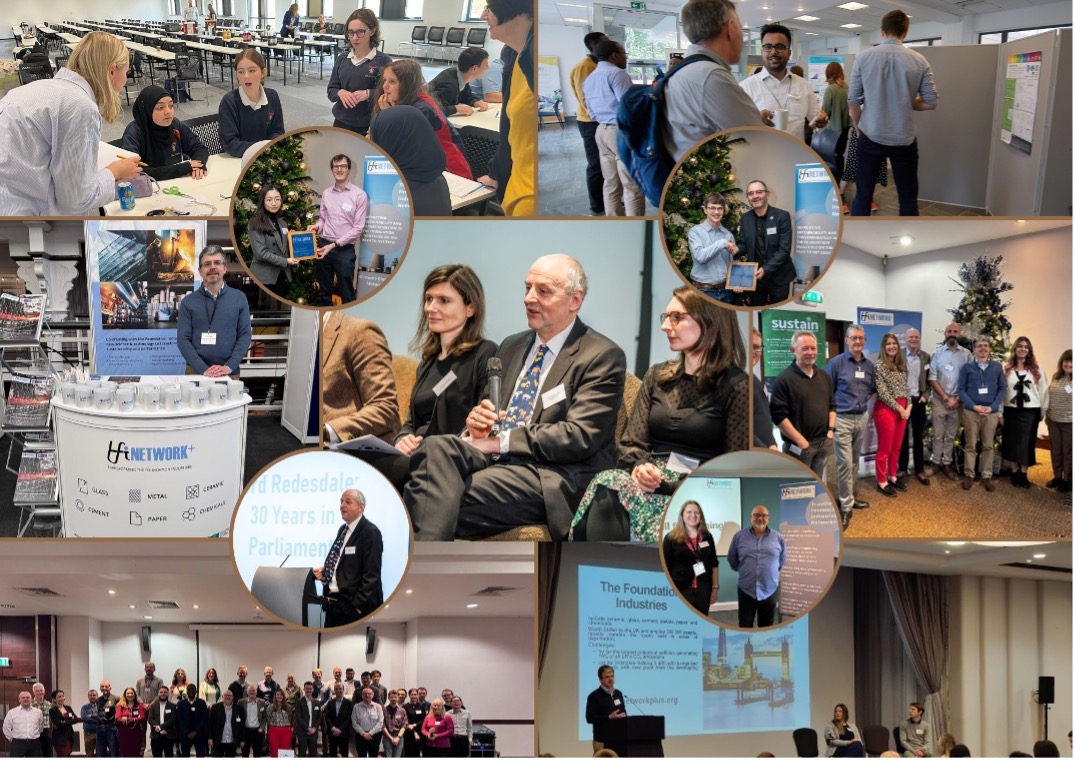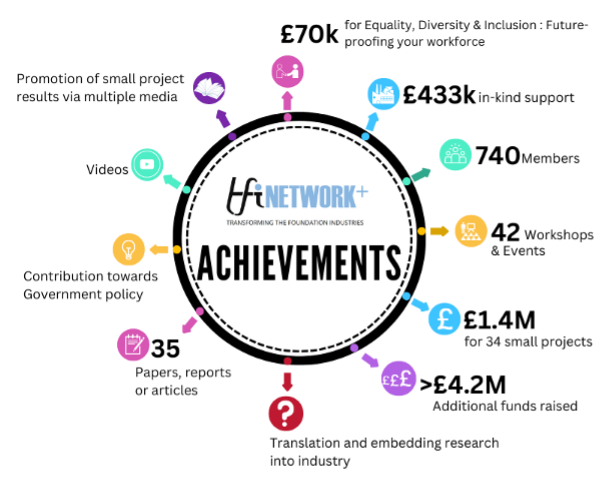Accelerating innovation through industry to academic collaboration in targeted projects
The strength of the UK research base provides an excellent opportunity for developing innovative solutions in industry but academic-industry collaboration is not always easy. The TFI (Transforming Foundation Industries) Network+ has demonstrated that targeted research projects, to test new ideas, can instigate new products and processes and have significant impact.

Research for innovation
Implementing new ideas in the foundation industries (cement, glass, ceramics, paper, chemicals, metals) is challenging for multiple reasons. However, to remain competitive in a global market with increasing pressure to decarbonise, innovation is essential. The strength of the UK’s research base provides a great opportunity for the industries to identify, test and develop new ideas. Academic-based researchers therefore have an integral role for the future of the UK foundation industries.
The collaboration between industry and academia is not straight-forward. Some say they talk different languages and clearly, they have different metrics. The focus of academia is the creation and sharing of knowledge while business is focussed on creating wealth. The difference often manifests in the timescales. Understandably, the business of knowledge creation requires persistent research, developing and testing ideas. Manufacturing businesses are typically measured on output on a daily or weekly basis, but researchers require more time to consider and develop solutions to the longer-term challenges that businesses face.
Project impacts
Over the last 4 years, the TFI Network+ has funded 34 3-6 month proof-of-concept projects in which researchers have investigated and tackled industry challenges. It is impressive how much has been achieved through these short, focussed projects. While these projects were focussed on low technology readiness levels, impacts have already been made. For example:
Peter developed a machine learning model to understand the link between the float glass production line operating parameters and the quality of the glass produced. NSG Pilkington were so impressed with the results that they recruited a full-time researcher to further develop these algorithms, and have embedded the software in their UK5 glass manufacturing plant, and a glass manufacturing plant in Brazil, resulting in energy and CO2 savings.
Alessia further developed biocomposite materials as low-carbon alternatives to ceramic tiles, in collaboration with DeakinBio, a spinout from the University of Manchester. The research helped develop a tile with equal or superior properties to traditional ceramic tiles and from these results, DeakinBio has since raised a further £96k via a grant and £700k of venture capital funding to enable them to scale up production.
Hussam designed, constructed and tested a Flat Heat Pipe heat exchanger system to extract low to medium grade heat that would otherwise be wasted to the atmosphere. Several systems have since been installed in companies (subject to confidentiality agreements) and data on their performance is being acquired and analysed.
Cristina developed an alternative to Coal Tar Pitch widely used in industry as a binder for precursors to carbon-based products. The alternatives are derived from biogenic sources to de-fossilise the products. Morgan Advanced Materials were sufficiently impressed with the results that they contributed towards a £116k project to further develop these results.
The TFI Network+ have demonstrated that these short-term focussed projects act as a catalyst for industry-academic collaboration and instigate new products and processes. Those projects with the greatest impact, at least in the short term, have had strong industrial support. It is incumbent on industry to take advantage of these opportunities to strengthen links with researchers and develop new ideas.
Moreover, agile projects designed for a quick turnaround provide an opportunity for early career researchers, who may lack the extensive track record required for more established funding schemes, to engage with businesses and learn how to manage their own research grants.

TFI Network+ impact
From an initial £1.4M of funding, £4.2M has been raised for further research into these projects. In addition, many of the projects were led by early career researchers, providing them the opportunity to develop their expertise and career. The TFI Network+ has created a platform over multiple years to be able to respond to industrial needs by shaping the different funding calls. For example, in the final funding call, the projects were focussed on collaboration with social sciences, recognising the need to address the behavioural and cultural aspects of transformation of the industries. This resulted in one project which engaged three businesses to pilot a unique development and coaching proposition that empowered businesses to co-design and deliver Equity, Diversity, and Inclusion culture change, using innovative top-down/bottom-up approaches, participatory methodologies and principles of co-production.
The TFI Network+ has demonstrated how short, focussed projects can address industry needs to deliver rapid impact balanced with developing a platform to realise more fundamental transformation of industry.
To find out more about the TFI Network+ projects:
Related content

Foundation Industries
Situated in our industrial heartlands, these sectors include metals, ceramics, glass, chemicals, paper and cement, producing 28m tonnes of material per year, and are worth £52bn annually to the UK economy.


